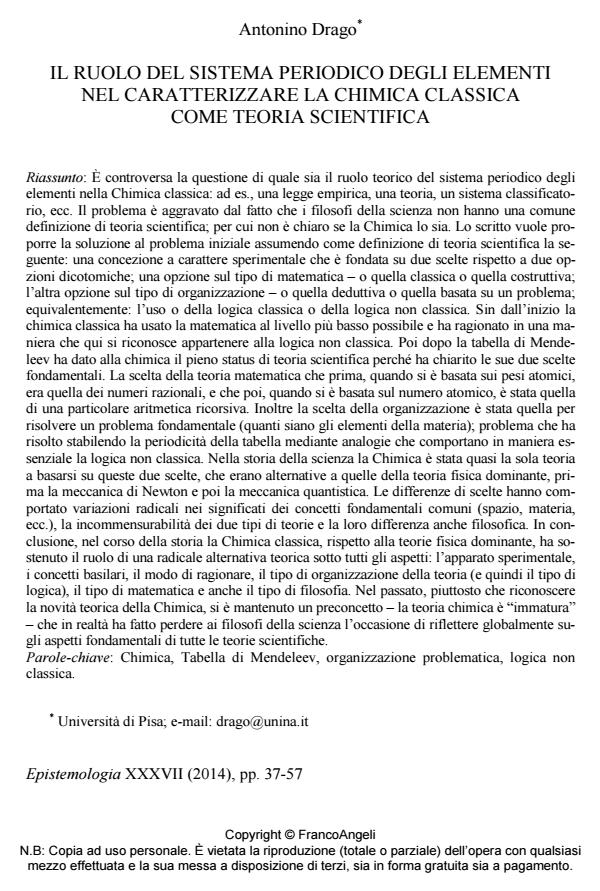Il ruolo del sistema periodico degli elementi nel caratterizzare la chimica classica come teoria scientifica
Journal title EPISTEMOLOGIA
Author/s Antonio Drago
Publishing Year 2014 Issue 2014/1
Language Italian Pages 21 P. 37-57 File size 647 KB
DOI 10.3280/EPIS2014-001003
DOI is like a bar code for intellectual property: to have more infomation
click here
Below, you can see the article first page
If you want to buy this article in PDF format, you can do it, following the instructions to buy download credits

FrancoAngeli is member of Publishers International Linking Association, Inc (PILA), a not-for-profit association which run the CrossRef service enabling links to and from online scholarly content.
The role of the periodic system of the elements in the characterisation of Classical Chemistry as a scientific theory. In classical Chemistry the theoretical role of the periodic table is controversial; possible answers are an empirical law, a theory, a classificatory system, etc.. The question is not easy also because a commonly shared definition of a scientific theory is lacking. The present paper proposes a solution to the former question by assuming a new definition of a scientific theory: It is an experimental conception which is founded upon two dichotomic options; one option is on the kind of mathematics - either the classical one or the constructive one; the other option is on the kind of organisation - either the deductive one or the organisation aimed at solving a basic problem; equivalently, the kind of logic - either classical logic or non-classical logic. Since its beginnings, Chemistry made use of a mathematical theory at the lowest level as possible and moreover it argued in a way which here is recognised to be of non-classical logic. Later the discovery by Mendeleev of the table of the elements gave to Chemistry the full status of a scientific theory through two accurate choices on the above-mentioned options. Indeed, after having introduced the mathematics of rational numbers through the representation of the atomic weights, this table relied in an essential way on a basic parameter, the atomic number, whose values introduces a kind of recursive arithmetic. Moreover, this table made clear that Chemistry is organised in order to solve the problem of how many are the elements of matter; the solution is based on the periodicity of the table, which is obtained by arguing through analogies among the elements, i.e. by arguing through non-classical logic. In the history of science, Chemistry relied on these two choices which were the alternative ones to those of the dominant physical theory, i.e. in a first time Newtonian mechanics, then quantum mechanics. These differences in the choices generate radical variations in the meanings of the common notions (e.g., space, matter, etc.) and an incommensurability phenomenon even in the basic philosophy. The paper concludes that in the history of science classical Chemistry played the role of a radical alternative to the dominant physical theories under all aspects, i.e. the basic notions, the way of reasoning, the kind of theory organisation, the kind of mathematics and even the kind of philosophy. In the past, rather to recognise this novelty, it was maintained a pre-conception - i.e., Chemistry is an "immature" theory - which refrained philosophers of science to ponder on the basic features of the whole set of the scientific theories.
Keywords: Chemistry, Mendeleev’s Table, problem-based organization, non-classical logic
- A New History of Logic: The Laborious Birth of a Formal Pluralism Antonino Drago, in Advances in Historical Studies /2021 pp.247
DOI: 10.4236/ahs.2021.104016 - Chemistry Education and Contributions from History and Philosophy of Science Mansoor Niaz, pp.159 (ISBN:978-3-319-26246-8)
- Joule’s Experiment as an Event Triggering a Formalization of a Baconian Science Till Up to an Alternative Theory to Newton’s One Antonino Drago, in Foundations of Science /2021 pp.585
DOI: 10.1007/s10699-020-09667-z
Antonio Drago, Il ruolo del sistema periodico degli elementi nel caratterizzare la chimica classica come teoria scientifica in "EPISTEMOLOGIA" 1/2014, pp 37-57, DOI: 10.3280/EPIS2014-001003